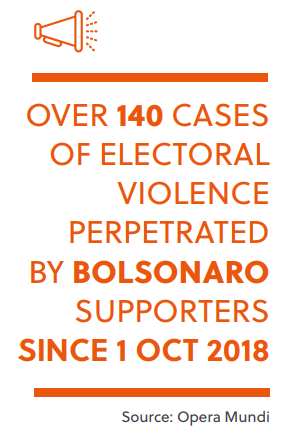On a Short Fuse: Violence Amid Brazil's Divisive Presidential Election Period
DIVISIVE RHETORIC
Bolsonaro, who has modelled himself as a tough “law and order” candidate, has been a familiar conservative political figure in the Brazilian congress for over a decade. He is known for making inflammatory and controversial comments against left-wing supporters, women and various minority groups, particularly the LGBT community. For example, on 22 October, Bolsonaro himself declared that it was time to “machine-gun Worker´s Party supporters”, and that left-wing supporters would have two options if he won: to leave the country or go to jail. In contrast, centre to far-left supporters of main opposition candidate, the Partido dos Trabalhadores’ (Worker´s Party, PT) Fernando Haddad, rallied around an anti-fascist and pro-democracy campaign, denouncing Bolsonaro and his incendiary electoral rhetoric. The fundamentally opposed positions of the two camps precluded the possibility of finding common ground, and the extent of this division has manifested in a number of violent episodes.
POLITICALLY-CHARGED ATTACKS
The tense atmosphere around the election has led to outbreaks of violence during demonstrations and political rallies by both parties, as well as episodes of public and interpersonal, politically-charged violence. The most high-profile incident of violence in the lead-up to the election was the 6 September stabbing of Bolsonaro himself, during a campaign event, by a non-politically affiliated perpetrator. However, beyond this there has also been a consistent stream of politically charged, street level attacks. For example, the left-leaning news website Opera Mundi mapped out over 140 cases of electoral violence perpetrated by Bolsonaro supporters since 1 October, ranging from vandalism, verbal harassment and threats of physical assault against Haddad supporters, to incidents of homicide.
In other examples, on 8 October, in Salvador, Bahia State, a political argument in a bar on Vasco da Gama Avenue, saw a Bolsonaro supporter stab a 63-year-old man to death and grievously injure another. More recently on 27 October, a 23-year-old man participating in a pro-Haddad rally was shot and killed by alleged Bolsonaro supporters in Pacajus, Ceará.
Violence by Haddad supporters directed at Bolsonaro supporters have been relatively less frequent, but several incidents have nevertheless been reported. For example, on 11 October, an argument between a bookseller in Fortaleza, Ceará, and pro-Haddad activists escalated into violence when the former refused to accept the activists’ pamphlets. Reportedly, the activists then assaulted him, and the victim died in the hospital nine days later from his injuries.
Politically-charged violence of this kind has primarily been conducted by individuals or loose bands of politically like-minded individuals, rather than by organised groups. The weapons used in past attacks have generally been rudimentary, principally knives and other improvised weapons. While the use of such weapons demonstrates that the sophistication level of the attackers remains low, these have nevertheless demonstrated the intent, and capacity to instigate fatal attacks, both planned and spontaneous.
Sporadic cases of politically-motivated violence will likely continue past Bolsonaro's inauguration.

VIOLENCE EMBOLDENED?
With the Bolsonaro victory on 28 October, cases of interpersonal political violence are likely to become less frequent in the short term as street-level campaigning activity dies down. However, the election of a president who has repeatedly endorsed far-right policies is likely to embolden the right-wing fringes of Brazilian society who may sense a more permissive environment to carry out
politically-charged attacks against ideological opponents.
Additionally, opposition to Bolsonaro’s platform will likely manifest in volatile episodes of civil unrest. On 30 October, for example, a protest led by social movements and workers’ unions in São Paulo demanding Bolsonaro adhere to democratic norms turned violent when fringe protesters constructed barricades and caused localised malicious damage. Police responded with tear gas and stun grenades. Sporadic cases of politically-motivated violence will likely continue past Bolsonaro’s inauguration. Bolsonaro’s past behaviour gives little indication that his rhetoric will soften during his presidency. Brazil’s previous presidents have often resorted to rule by decree, which further suggests that the political compromises generally associated with the building of broader coalitions will not be necessary for Bolsonaro to further his agenda. As a result, we can expect the social divisions associated with the election campaign to persist, and culminate in further incidents of violence and civil unrest similar to those seen during the election period